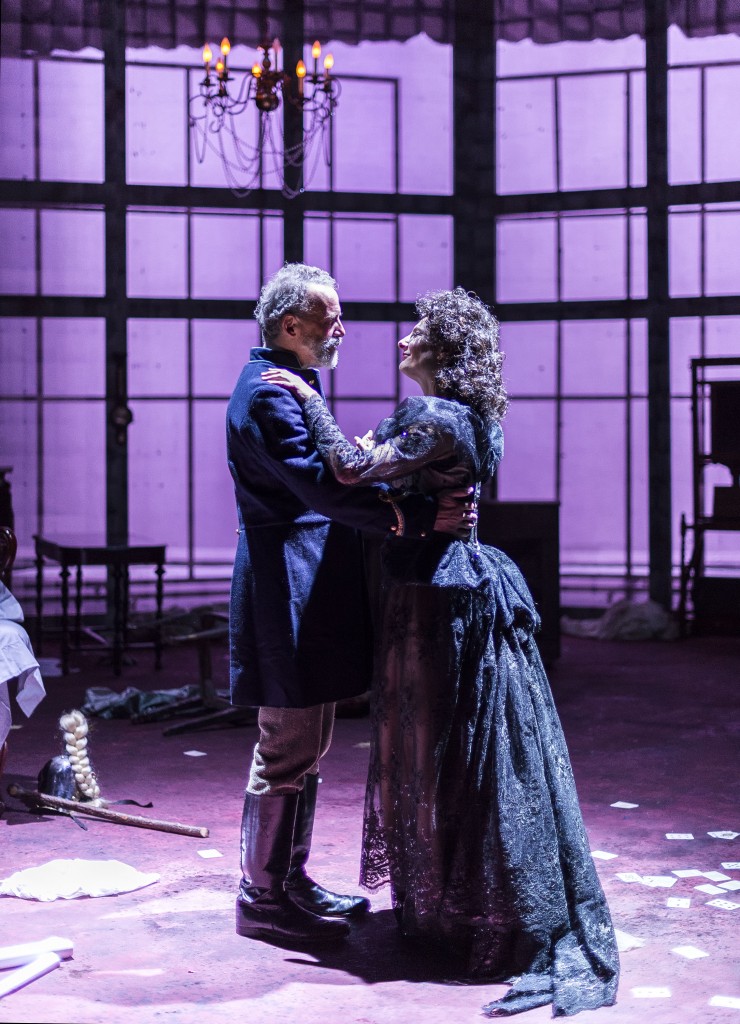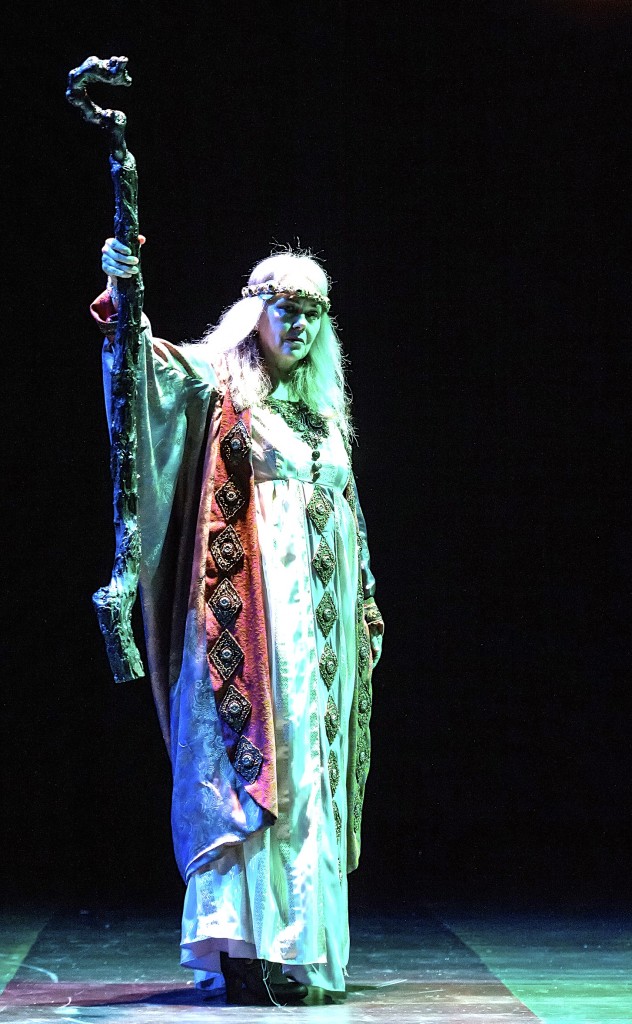The classical rep of A Noise Within (ANW) has started its fall season with a healthy variety: a triple-header that includes Oscar Wilde’s The Importance of Being Earnest (not seen by me) Shakespeare’s The Tempest (with Deborah Strang as a female Prospero) and August Strindberg’s The Dance of Death.
Strindbeg puts in rare appearances on modern stages, probably because the extant translations of his plays are a bit musty and the plays, like the climate of his native Sweden, are angry and unforgiving. But the choice by ANW of The Dance of Death, in a more naturalistic and more recent translation by Conor McPherson, is a surprisingly good one. It is staged here by ANW Artistic Co-Directors Geoff Elliott and Julia Rodriguez-Elliott, and does not so much soften this scorched earth battle of the sexes as punch up the humor in the ferocity of the relationship. (Isn’t all marital Punch & Judy ultimately laughable?)

So while life is no picnic with Edgar, a retired artillery captain (Geoff Elliott, in a subtle and cheeky performance) and his wife Alice (Susan Angelo, every bit Edgar’s match), the rounds of lies, deceptions, attacks and counter-attacks make the most of the underlying frustrations and dark humor that leaven the fury of their wedded bliss. The mutual viciousness is so extreme, and the flailing interventions of Alice’s bystander nephew, Luke (a fine Eric Curtis Johnson), caught in the middle and so weak, that we’re left with a perfectly plausible vision of hatred as a form of co-dependent love.
Appropriately gloomy period sets and costumes (by Angela Balogh Calin) and lighting to match (from the ever-dependable Ken Booth) round out a production that is at once engrossing and vastly entertaining, more so perhaps than Strindberg had intended, although that’s open to debate. But it’s entirely believable in a time when extremes of bad behavior are viewed with much greater cynicism, leniency, and levity. Call it the 1890s version of Edward Albee’s Who’s Afraid of Virginia Wolf that similarly owes its success to the lip-smacking humor of its harshness.
The Tempest, on the other hand, is traditional in every way were it not for Prospero’s sex change. Again staged by Geoff Elliott (who also plays Caliban) and Julia Rodriguez-Elliott, the gender change has no significant impact on the production. This is mildly disappointing in that it also offers nothing that is particularly fresh.
The lyricism of key speeches is not lost so much as weakened by the women’s voices (particularly Strang’s as Prospero and Alison Elliott’s as Miranda). They are too conversational to fully inhabit the demands of the text. (Shakespeare or no Shakespeare, this is a common ailment on many American stages, where the cultivation of strong vocal chops has been neglected since the advent of actor microphones. The issue is not a matter of volume — the mics take care of that — but of heft and elasticity in tone and timber.)

Some of the costumes by Balogh Calin border too closely on a Hallowe’en effect, especially in the wedding scene, and Booth’s lighting feels uncommonly dark for a play whose circumstances have a melancholy but joyful ending. Missed at the performance I attended was Prospero’s final speech: a plea to the audience for applause and a good sailing wind, both of which are always earned and gladly granted.
A Noise Within, 3352 East Foothill Blvd., Pasadena, CA 91107
Tickets: $20-$40, www.anoisewithin.org or 626.356.3100 ex 1
Check calendar for rep performance schedules, through Nov. 22
Across town at the Audrey Skirball Kenis Theater at the Geffen Playhouse, playwright Scott Carter’s The Gospel According to Thomas Jefferson, Charles Dickens and Count Leo Tolstoy: Discord is an event more intriguing for its title than its content. Despite the explicit lead-in, the performance is an extended philosophical dispute among these three historical giants, whose lives and accomplishments are well known to all.
(l-r: David Melville, Armin Shimerman and Larry Cedar in Discord. Photo by Michael Lamont.)
Perhaps too well known. In this mock conundrum, the men find themselves posthumously thrown together in an antiseptic room furnished with just a metal desk and three chairs. They have no idea why they’ve been sent there or what they’re supposed to be doing, let alone what will unlock the single door that pens them in. A drawer in the desk provides a few indirect clues and it’s not long before these three opinionated guys are going at each other with strong, divergent views on religion, philosophy and the gospel according to each one of them.
It’s an idea that promises more comic entertainment than it delivers. Our protagonists are full of words, words, words, most of them uttered at breakneck speed. Armin Shimerman’s stab at Tolstoy’s Russian accent too often makes his discourse hard to follow, and David Melville’s manic Dickens usurps the stage (much as Dickens did in life) with a forceful yet almost spastic performance that eventually wears out its welcome. Larry Cedar’s Jefferson, the most subdued and seemingly rational of the lot, is something of a relief — until, of course, all three are forced to square the conduct of their lives with their declared convictions and beliefs.
Cute idea, but Discord is an intellectual disruption masquerading as a play and not as provocative as it ought to be since we already know so much about these players. The result is a finale that we see coming long before it does. All of which makes this talky intermissionless 85-minute exercise feel longer than it is. Director Matt August, however, uses the neutrality of the setting for some clever visual effects that support the action well and are the most striking aspects of this enterprise.
In an article in the program, Carter explains what compelled him to write this piece over many years. It’s a lively story that’s ultimately more captivating than what we get on stage.
Audrey Skirball Kenis Theater at the Geffen Playhouse
10886 Le Conte Avenue, Los Angeles, CA 90024. Through Nov. 23.
Tickets: $69-$74, www.geffenplayhouse.com or at 310.208.5454 or in-person at the Geffen box office.
Top image: Susan Angelo (foreground) and Geoff Elliott in The Dance of Death. Photo by Craig Schwartz.

